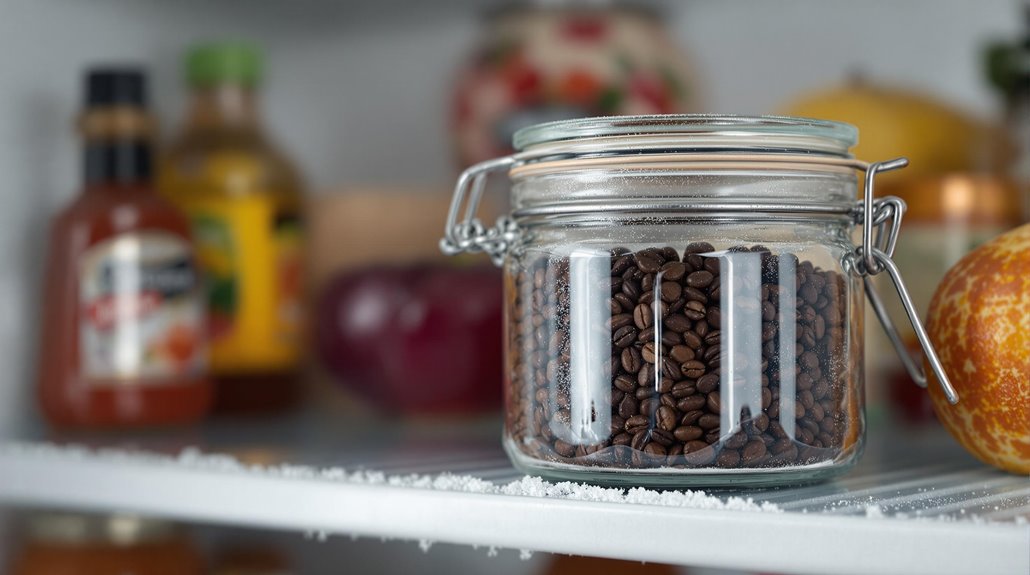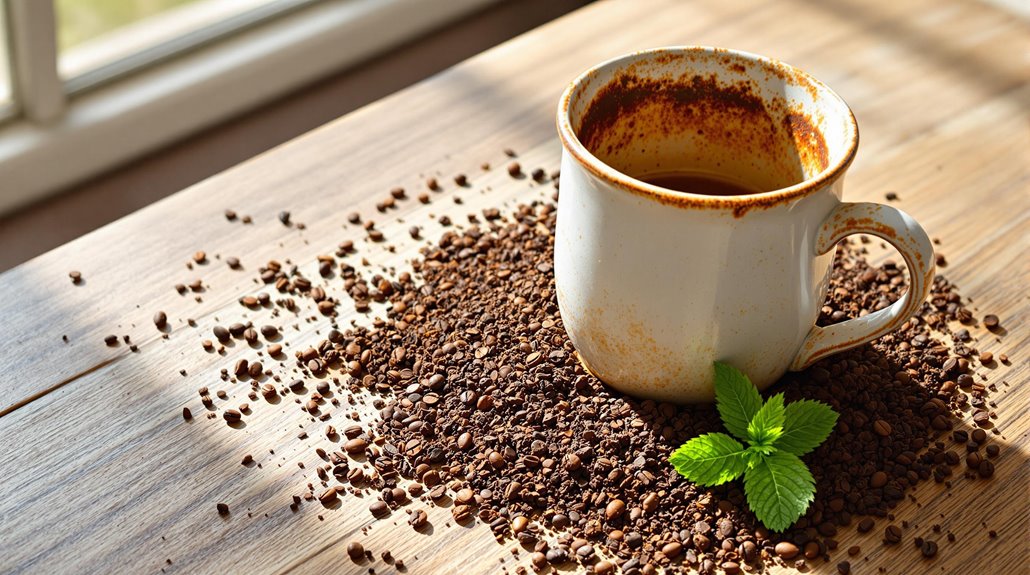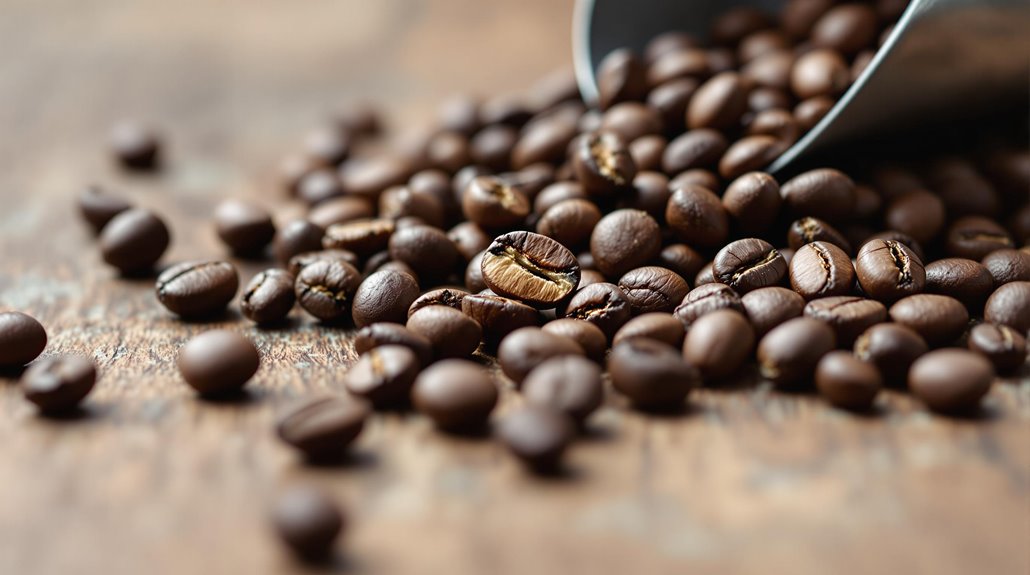







You might think your coffee stays fresh as long as it's sealed, but the truth is more nuanced. The moment coffee is roasted, it begins to lose its flavor, and how you store it plays a critical role in preserving its quality. Whole beans and ground coffee don't age the same way, and factors like air, light, and temperature can drastically shorten their lifespan. If you've ever wondered why your morning brew tastes off, the answer might lie in how you're handling your beans. But what exactly makes coffee go stale, and how can you keep it fresh longer?
Key Takeaways
- Whole coffee beans stay fresh for 2-4 weeks after roasting when stored properly in airtight containers.
- Ground coffee degrades faster, losing peak flavor within 1-2 weeks due to increased oxygen exposure.
- Vacuum-sealed whole beans can remain fresh for up to one year if unopened and stored in cool, dark conditions.
- Stale coffee shows dull, matte beans, lacks aroma, and produces flat or bitter flavors when brewed.
- Grind coffee just before brewing to maximize freshness and minimize oxidation from increased surface area.
Factors Affecting Coffee Freshness
Several factors influence how long coffee stays fresh, with oxygen exposure being one of the most critical. When coffee is exposed to oxygen, oxidation occurs, breaking down aromatic compounds and leading to flavor degradation. The surface area of coffee plays a major role here—whole beans have less surface area exposed to oxygen compared to ground coffee, which degrades faster due to increased oxidation. To minimize oxygen exposure, store your coffee in airtight containers, as they create a barrier against air infiltration. Industrial methods like nitrogen flushing and vacuum sealing are highly effective, as they displace oxygen and create an oxygen-free environment, extending freshness. Heat and light also accelerate oxidation, so keep your coffee in a cool, dark place to preserve its quality. Additionally, the roast level affects freshness; darker roasts degas faster, releasing carbon dioxide more rapidly and losing peak flavor sooner than lighter roasts. By controlling these factors—oxygen, surface area, heat, and light—you can greatly prolong the freshness of your coffee.
Whole Beans vs. Ground Coffee Longevity
The longevity of coffee freshness varies considerably between whole beans and ground coffee due to differences in surface area exposure and oxidation rates. Whole beans retain their aromatic oils and flavor compounds longer because their intact structure minimizes exposure to oxygen. When stored properly, whole beans stay fresh for 2-4 weeks after roasting, and unopened, vacuum-sealed packages can extend this to up to one year. In contrast, ground coffee degrades much faster, typically losing freshness within 1-2 weeks. Grinding increases the surface area, accelerating oxidation and causing the aromatic oils to break down more quickly. Unopened ground coffee in vacuum-sealed packaging may last 3-5 months, but its flavor quality diminishes over time. For the best results, you should grind whole beans just before brewing, as pre-ground coffee begins losing its peak flavor within hours of grinding. This practice preserves the integrity of the flavor compounds and guarantees a more vibrant cup. By prioritizing whole beans and grinding them fresh, you maximize the coffee's freshness and enjoy its full aromatic potential.
Best Practices for Storing Coffee
To maintain coffee's freshness and flavor, proper storage is essential. Store coffee beans in an air-tight container to minimize oxygen exposure, which accelerates oxidation and degrades quality. Choose opaque containers or keep coffee in a cool, dark place to protect it from heat and light, both of which can break down aromatic compounds. UV light exposure, in particular, can rapidly diminish flavor, so avoid transparent packaging or direct sunlight. Maintain a stable environment with temperatures between 15-25°C (59-77°F) to prevent temperature fluctuations that can cause condensation and spoilage. Avoid refrigerating or freezing coffee, as moisture and inconsistent temperatures can compromise its integrity. If you must grind coffee beans, do so just before brewing to reduce surface area exposure to air, which helps preserve freshness. By following these evidence-based practices, you'll extend the shelf life of your coffee and guarantee it retains its peak flavor profile. Proper storage is a simple yet critical step in safeguarding the quality of your coffee.
Signs of Expired or Stale Coffee
Even with proper storage, coffee can lose its freshness over time, and recognizing the signs of expired or stale coffee makes certain you avoid a subpar brewing experience. Fresh coffee beans have a glossy appearance due to their aromatic oils, which contribute to their rich flavor and aroma. In contrast, stale coffee beans lose this glossy appearance, becoming dull and matte. If you notice no oily residue on your hands after handling the beans, it's a clear indicator they've gone stale. Expired coffee may emit a rancid smell or even a moldy smell, signaling it's no longer safe to consume. When brewed, stale coffee often produces a flat taste or an overly bitter taste, even when prepared correctly. These changes occur as the aromatic oils degrade, leaving behind a lackluster flavor profile. By identifying these signs—dull beans, absence of oily residue, unpleasant odors, and poor taste—you can make sure you're only brewing with fresh coffee beans, preserving the quality of your cup.
Extending Coffee Freshness at Home
Preserving coffee freshness at home requires minimizing exposure to factors that degrade its quality: oxygen, light, heat, and moisture. To keep your coffee fresh, store whole roasted beans in an airtight, opaque container. Avoid transparent bags or containers, as light accelerates oxidation, which diminishes flavor. Keep the container in a cool, dark place, ideally between 60-70°F (15-21°C), to prevent heat from degrading the beans. For the best results, grind your coffee just before brewing, as ground coffee loses freshness faster due to increased surface area exposed to oxygen. If you use a resealable bag, press out excess air before sealing to reduce oxidation. Vacuum-sealed canisters, like Fellow Atmos, can extend freshness by removing air, keeping your coffee fresh for up to 2-4 weeks after opening. Purchase coffee in smaller quantities to guarantee you consume it within 2-4 weeks of roasting, as this is when it's at its peak flavor. By following these steps, you'll maximize the shelf life and quality of your coffee.
Disclosure: As an Amazon Associate, I earn from qualifying purchases.




